It was a town largely built by the ground’s treasures of lead, zinc, silver, and gold. The (mostly) men and machines worked underground, extracting metals worth millions of dollars. Leadville, Colorado was founded in 1877 to help support the massive mining efforts occurring in the vicinity. For decades, men (and a few women) of all backgrounds traveled to Leadville in search of jobs, earning a spot beneath the mountainous ground.
“At that point, Leadville was the place to be,” Merilee Maupin said. “The mine was doing great. It was hard to find housing in the area. It was a major hub.”
“Yeah, life was good here in Leadville in the 1970s,” Ken Chlouber added. “The mine paid very good wages. We were all making good money and paying very few taxes.”
By 1982, the major mining era of Leadville ended, and so did more than 3,000 mining-related jobs. Quickly, a ghost town evolved out of what was once a boom town.
Many trail and ultrarunners have heard how the Leadville Trail 100 Mile came to be. Created to save the tiny town following the mining bust, it is now one of the largest ultramarathons in the U.S. Once you get in, you become a part of the Leadville family. A whole new community today thus revolves around Leadville. But how did this happen? And why? And, who are Ken and Merilee, the race’s founders?
Ken Chlouber came to Leadville looking for employment and finding it as a shift-work miner with his wife and one son in the mid-‘70s. Originally from Oklahoma, Ken had a degree in biology and a post-collegiate job working for the state’s wildlife department, mostly in aquatic environments.
Merilee was born and raised in Texas. She pursued teaching until her marriage to her husband took her from school to Leadville, for his job in the mines. He passed away several years later, but by then Merilee and her daughter had already come to love the small town.
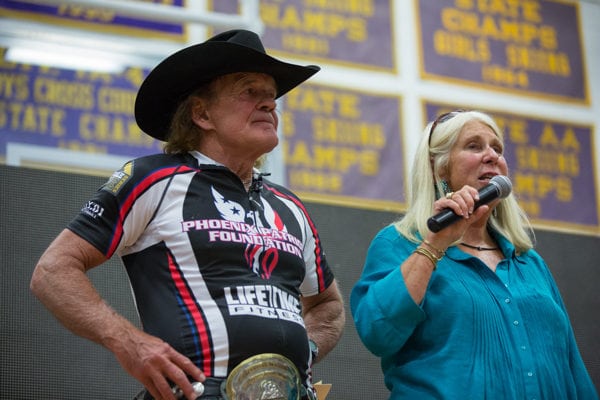
Ken Chlouber and Merilee Maupin talking to racers before the 2015 Leadville Trail 100 Mile. Photo: Glen Delman
The closing of the mines were devastating. Not only did many community members lose their jobs, but also the town’s economic web broke down.
“We were losing jobs and the abuses came with it: alcohol, drugs, spouse,” Ken explained. “Basically everybody in the community was out of work. People had nothing to do and they didn’t have any money. Men spent their free time at the bars.”
People flooded Merilee’s office, who worked as the town’s travel agent, looking for one destination: out of Leadville.
The governor at the time told Ken, one of the county commissioners, that they had to find a way to get people to the city and fast. Use the heritage, use the beautiful mountains, whatever it took, he told them. The city needed visitors, and visitors spending money.
“The key is to get people to stay overnight,” Ken said. Ideas of fairs, festivals, and 10k races were thrown out by the remaining townspeople, but Ken knew it wouldn’t be enough. “My bright idea was that if they run 100 miles, they are going to have to stay overnight. That is why we picked the 100-mile distance and since we were both basically out of work, we jumped in and lit the candles.”
“And it worked.”
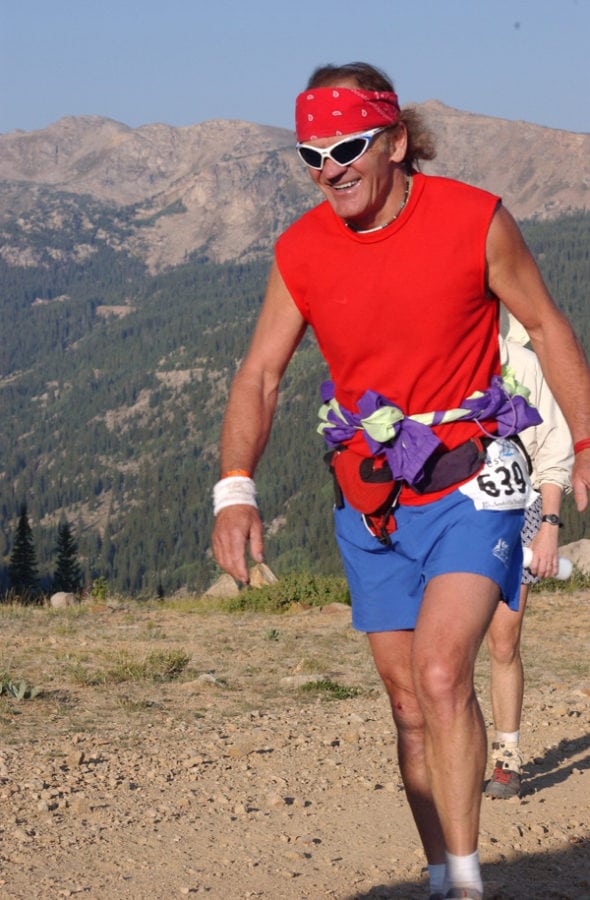
Ken on the Leadville course. Photo courtesy of Merilee Maupin.
Ken and Merilee came together as friends, drawn together by running, and have stayed business partners in the sport for years. They met each other during the burro races. Not riding them, but running alongside the burros–the Spanish name for donkeys–up and down a mountain outside of Leadville to a place called Mosquito Pass. It was an annual tradition, a race Ken says was just too much fun not to join in, and was distanced between 15 and 30 miles. The two ran the race every year, they said.
In that period, ultrarunning was still pretty unknown in the world, Ken said, especially to the duo who have never run longer than those 30-mile races with the animals. However, Merilee said it was not hard to earn the trust of the community.
“Everyone was 100% on board,” she said. From aid-station crews to hospital medics, every volunteer at the first Leadville Trail 100 Mile race came from the town.
“The whole community helped us,” Ken said. “All the elected officials, city council, commissioners, even the board of service jumped in. The district ranger rode his horse to Hope Pass, the course’s high point at about 12,500 feet altitude, to volunteer. Everybody was focused on saving Leadville.”
The first race was held in September of 1983 with 45 racers. Those who came to the inaugural run heard about it through word of mouth and flyers tacked up in nearby towns. That year all 45 racers started and finished the race in Leadville, birthing a successful ultramarathon. Over the years, the race has changed to avoid pavement stretches, but overall, Merilee said it has not changed from the first time Ken blew the starting horn. And, according to Ken, the race cannot be made too much tougher.
“I don’t think we can make it any more difficult,” he said. “The key to success of the race is the difficulty. People want to test themselves. They don’t want a cupcake race.”
It is a tough race, it is a bad race, created by the toughest and the baddest, Ken said. From mile one, Ken and Merilee knew this race was going to be directed differently. Ken ran other races to see how other directors did it, which resulted in teaching him a lot about the art of ultrarunning and directing.
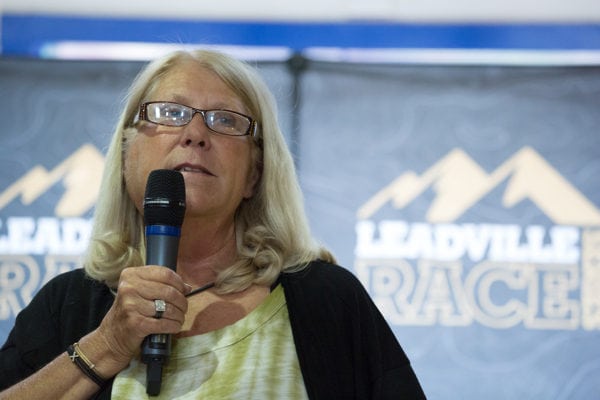
Merilee announcing to the Leadville audience four years ago. Photo: Glen Delman
Leadville was more than just putting on a race for Ken and Merilee. Ken described it as a business, one that would do anything for their “customers.”
“I said we were going to treat them good. They are here to spend money, so we are going to treat them like customers. That is just good business,” he said. “But, Merilee said no.”
“She said, ‘No, it was more than that,’” Ken recalled. “’We are going to treat them like family.’ And that’s been a huge key to the success.”
“She has been their momma’ since day one,” Ken said. “Everybody loves the family-friendly perspective and she gets total credit for that.”
The primary purpose was always to create a beneficial economic impact to the town and to keep the race a community-driven event. To do this, the duo crafted cornerstones to adhere to over the years, including that the race would always start and end in the town and no one, including them, would be selfish or self-serving.
Concerning the health and safety of the runners, Ken made sure the course was doable, doing so by the only way he knew how: by running the race himself. As a miner doing shift work, Ken led a group of men deep into the mines to dynamite the big rocks that wouldn’t move easily.
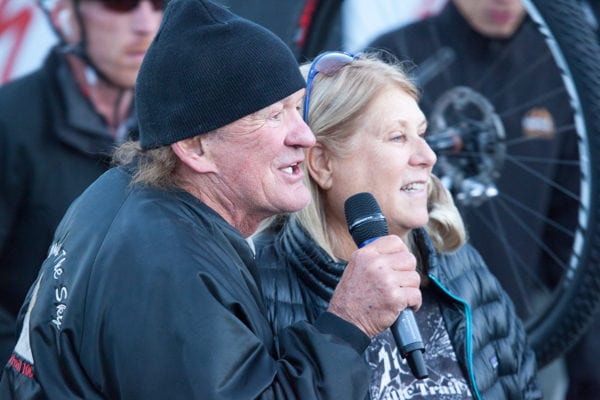
Ken and Merilee speaking to Leadville Trail 100 Mile Bike Race participants. Photo: Glen Delman
“It was a part of my make-up. I didn’t want to ask anyone to do what was dangerous and something I wouldn’t do myself,” he said. “It was the same thing with the race.”
Ken has entered the race about 26 times, finishing it 14 times.
“It was a great learning process along the way,” he said. “I found out what people were made out of, what makes them go and not go. I learned about finishing and not finishing.”
Merilee competed and won a 50-mile race in Texas, but when it came to her Leadville race, she was too busy mothering her runners.
In 2001, Ken and Merilee founded the Leadville Trail 100 Legacy Foundation. In the early years of the organization, any extra money from the race went to helping the community in anonymous ways. Things like supplying the schools with running shoes and sports equipment or buying groceries for a family in need, Ken said.
Now, the foundation contributes funds to an annual Christmas party for the local children, a near-30-year tradition, which started in the mining days. It also pays every graduate from Lake County High School a $1,000 scholarship if the student chooses to pursue a higher education, whether university or trade school, Merilee said.
Years ago, graduating from high school was the end of the line for the kids. So, both Ken and Merilee talk to the graduating class, telling them about the benefits of a higher education and about the scholarship.
“We had a few of them take us up on it during the first few years,” Ken said. “But we are really proud of the last two years.”
In 2015 and 2016, 100 percent of the students went on to a higher education and this year the 48 graduates earned $48,000 worth of scholarships.
“Every one of those kids earned one,” he said. “We hope we opened a door for them.”
Like the Leadville kids, the Leadville athletes walk into the open doors of the town. In doing so, participants join the Leadville family, opening themselves up in every possible way during the 100-mile journey.
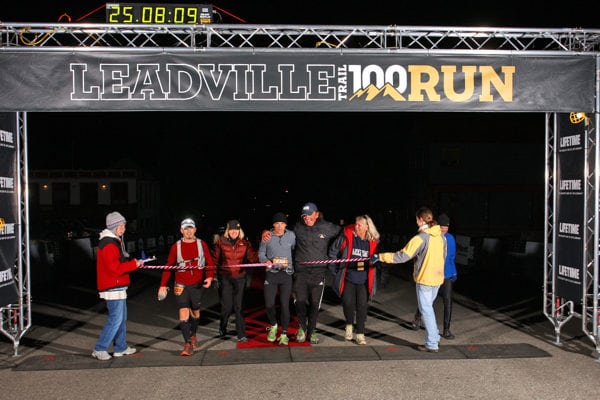
Ken and friends with Cole, Ken’s son, as he finishes the Leadville 100. Photo courtesy of Merilee Maupin.
Since 1982, the race directors have put on a race dedicated to the health and safety of each runner and quality of athletic experience. With a runner limit of less than 1,000, Ken said the race guarantees the alone time every runner in this sport yearns for at one point.
“You need to spend some time by yourself, do a little soul searching,” he said. “How can you be more? Do more? That all requires solitude and digging deep.”
Early on, as the travel agent in the town, Merilee knew personally each runner lined up outside her office with their entry in hand.
“In those early days I typed those names so many times,” she said. “People would come to town and I knew their names, their addresses…
“We knew their kids’ names, their dogs’ names…” Ken added, laughing. “We still do as a matter of fact because we got so acquainted with them in the ‘80s and ‘90s and some of them are still here today or we have their kids in the events.”
In 2014, one possible future Leadville runner crossed the finish line at the age of four months, in the arms of her father Nick Hobbs, of Indianapolis, Indiana. Coming in at 27 hours and 44 minutes, Nick walked over the line with Molly and straight into Merilee’s hugging arms.
“Merilee hugged us both and told me to ‘enjoy these moments,’” Nick said.
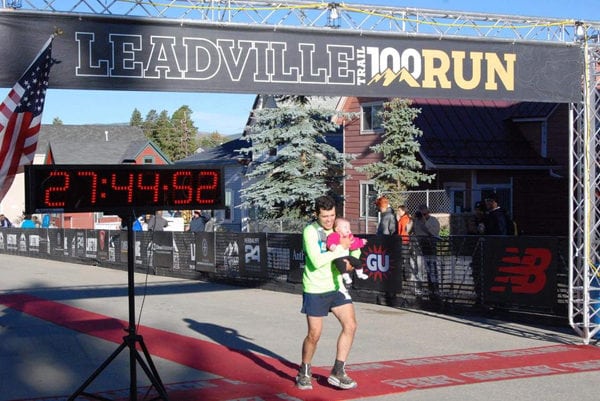
Nick Hobbs finishing the 2014 100-mile race with his daughter, Molly, in his arms. Photo courtesy of Nick Hobbs.
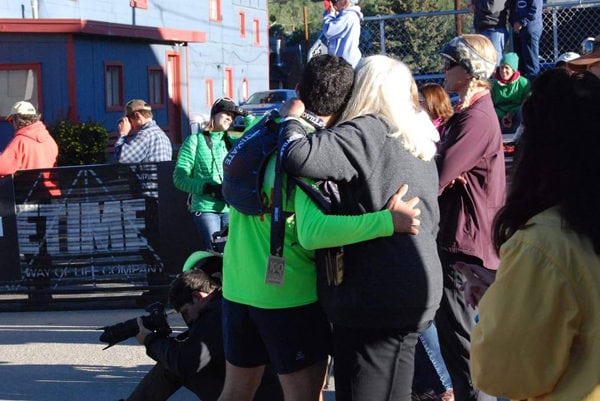
Nick Hobbs receiving a finisher’s hug from Merilee. Photo courtesy of Nick Hobbs.
By 1994, Ken and Merilee began adding more races to the Leadville summer calendar, including a 10k race, a half and full marathon, a 50-mile running race, and both a 50- and 100-mile bike race. Today, scores of athletes take on multiple Leadville racing adventures each summer.
Eventually, a venture-capital company offered the founders a significant amount of money to own the races, but according to Ken, the managers were going to get rid of all limits and rules. They were just going to take the money and go, focusing on their own profit instead of the town’s, he said.
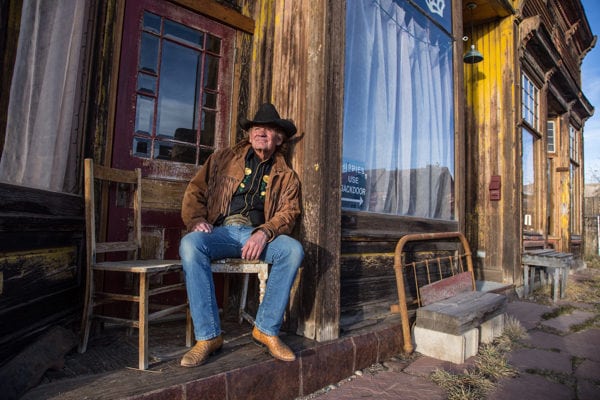
Ken in Leadville. Photo: Glen Delman
“We met with them face-to-face and told them, ‘No thanks,’” Ken said. “That was… let me tell you… for a couple of kids from Leadville… that was tough. We had to dig deep into our integrity because that was a lot of money.”
However, in 2010, another offer came from sponsor Life Time Fitness, owned by Bahram Akradi, who had been an athlete in the bike races. Was he and the company willing to keep the primary objectives of benefitting the community first, not making money the bottom line, and treating the racers like family?
“’Absolutely, that’s a done deal,’ he said,” Ken recalled. “We went ahead and made the deal and Bahram has so kept his word and beyond that.”
“He has brought a lot of promotion to our community and drawn a lot of people to these races,” Ken said.
Looking over the last 34 years, the race has waxed and waned again and again in its popularity, at times drawing elites and requiring a lottery for entrance. Some of the elites have included the iconic Ann Trason. She ran the race in a little over 18 hours in 1994, a course record which no other woman has yet approached. In 2005, Matt Carpenter, coming into the finish line in 15 hours and 42 minutes, set a positively incredible male’s course record.
Bree Lambert is a distinguished runner from California who came in 14th place last year.
“I definitely loved the race,” she said. “It was hard, but my experience was really good.”
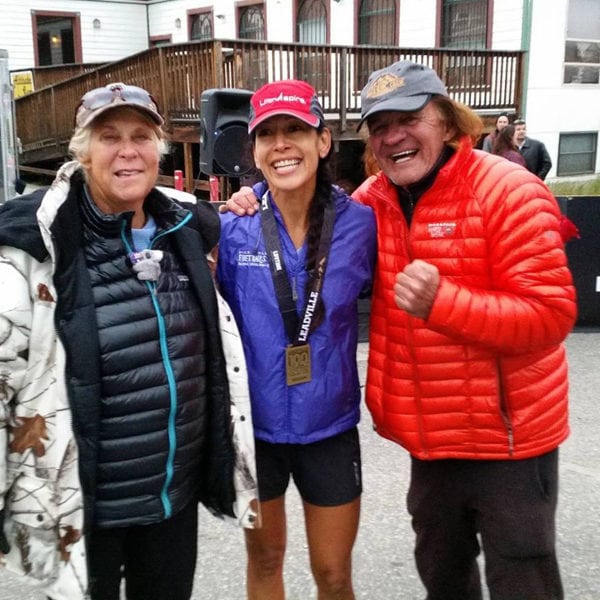
Bree Lambert with the race directors after finishing her first Leadville 100 in 2015. Photo courtesy of Bree Lambert.
Bree said running up Hope Pass was amazing, being at 12,000 feet above sea level and knowing there are so many people there to support the race.
“You feel the good energy there for all the runners,” she said.
To say the town has been saved would be an understatement. According to Merilee, an economic study done in 2012 conducted by the local college found the summer of races had a direct benefit to the community of about $15 million. Ken estimates that now the races raise about $20 million, all given back to the community.
“The indirect benefits though, we have had so many,” Merilee added. “People purchase homes, real estate, and businesses and the amount of PR that Leadville has gotten over the years is immeasurable. It’s incredible. If you have a Leadville shirt anywhere, in any airport, people will come up and talk to ya’, ‘Did you do that race?”
Overcrowding? Too many people? According to comments and articles, the 2013 race was overwhelmed with a whopping 946-runner start. Critics said the race was too crowded and had significant negative effects on the environment. Even the Hardrock 100 pulled Leadville’s status as a Hardrock qualifier because of the negative effects of the 2013 edition. Since then, the race organization has limited the race entrants to less than 700.
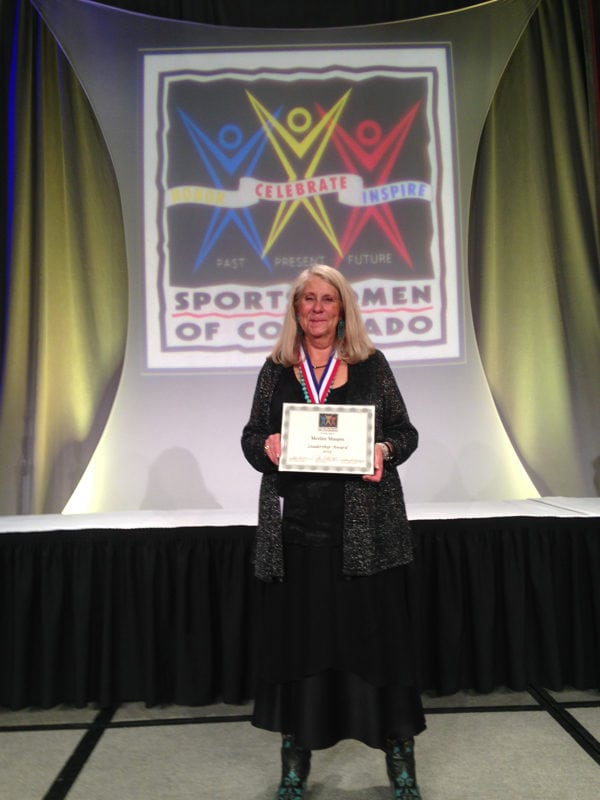
Merilee being named Sportswoman of Colorado. Photo: Glen Delman
But the two don’t look at the race as overcrowding the town. One thing to remember, Ken said, is Leadville itself: it’s the town with one unnecessary stop light at 10,200 feet altitude and snow before and after most other cities in the state. In the winter, the town loses everyone but the residents.
“The overcrowding for a few weeks? Yeah, we just got to love it,” he said.
“For the most part, it is just two weekends in the summer for the two big races,” Merilee added in.
During those two races, the 100-mile run and bike, a family reunion for athletes, directors, and volunteers takes place.
Every year, Ken will be at the starting line and Merilee at the finish, starting them off and welcoming them home. Throughout the race the two are there cheering racers on, mothering and fathering when needed. When Paul Stofko ran Leadville in 2008, the racers were doused in cold rain for hours. Heading up to Hope Pass Ken was standing at the top, and as Paul, a runner from northwest Indiana approached, he yelled, “Do you have a poncho?” Paul said no.
“He stated, ‘You are crazy, you need it,’” Paul recalled. “He took the one he was wearing and gave it to me.”
“As for Merilee, after the finish, she was with my finishing medal,” he said. “She gave me a big hug. A hug like you would receive from your mom congratulating you on a goal you achieved.”
Bree also experienced the big hug from both Leadville founders during her race, one that she was thinking about for miles.
“She tells you during her pre-race briefing she will hug you at the end,” Bree said. “There are so many people around you… for half a second you think, Yeah right.”
Bree thought wrong.
“In the last few miles I was thinking, “I wonder if she will be there?” she said. “She was. I got choked up. She gave me a rose and a hug and Ken gave me a huge hug.”
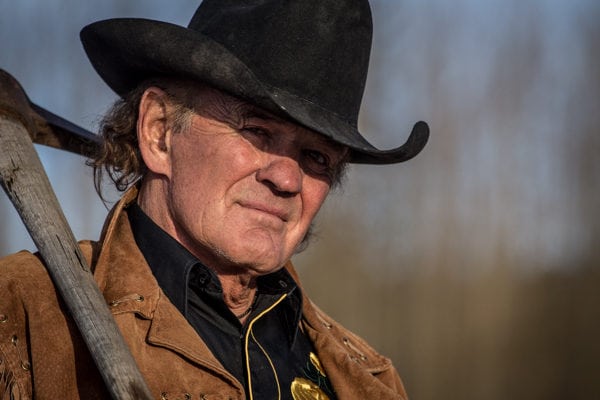
Ken. Photo: Glen Delman
The two now work with Life Time Fitness as consultants, and they work daily with the Leadville Legacy Foundation. Nevertheless, Ken and Merilee remain the founders of the Leadville Trail 100, inviting and hugging each finisher of the race, whether they cross the line at 17 hours or 28.
“The difference the race has made to the town is important,” Merilee said, adding in one more comment after the end of our interview.
“But I think even more important is the difference we make in the lives of our athletes, in our Leadville Trail 100 family, because to finish this race, you know that you can dig deep, you can make a commitment,” she said. “There is nothing like crossing that finish line.”
“Oh, good point,” agreed Ken. “It adds to your life. It adds to your family life, your business life.”
Before this Saturday’s 100-mile race starts in downtown Leadville, just like every race in the last more than three decades, Ken will address the Leadville athletes.
“This is going to be tough. This is going to hurt. You’ve got to dig deep and go on. You can do this and when you reach those places outside the race, in your regular life, those places when it gets tough, you know that…” he said.
“…You know you’re better than you think you are and you can do more than you think you can,” Merilee finished, quoting her co-founder’s well-known statement. “And that is the basis of Leadville.”
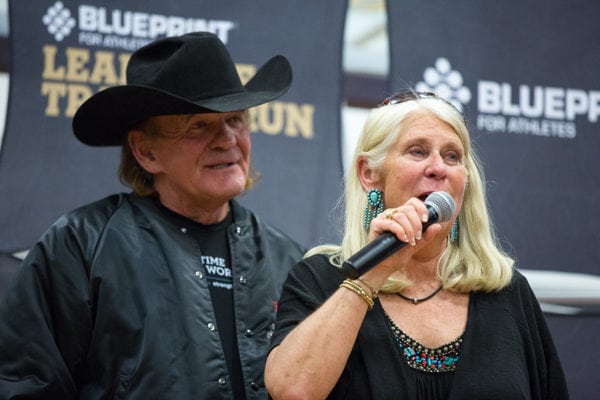
Ken and Merilee at the 2015 Leadville Trail. Photo: Glen Delman
Call for Comments (from Meghan)
- Do you know Merilee Maupin and Ken Chlouber? Can you share a story about them?
- Have you finished any of the Leadville Race Series races and received a greeting from Merilee or Ken?
